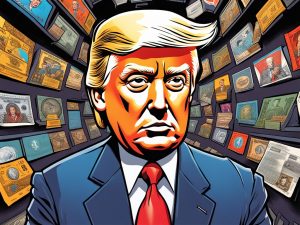Elon Musk Highlights Case for Bitcoin NFTs
In a recent podcast, Elon Musk unintentionally brought attention to the case for Bitcoin Ordinals, also known as Bitcoin NFTs. While mocking nonfungible tokens (NFTs), Musk pointed out that many NFTs are simply URLs to JPEGs and not actually stored on the blockchain. He suggested that NFT projects should encode the JPEG on-chain to prevent loss if the hosting company goes out of business.
Bitcoiners on social media saw Musk’s comments as a validation of Bitcoin Ordinals. These NFTs were launched in January by developer Casey Rodarmor, leveraging the Taproot soft fork. They allow for image and text inscriptions directly on Bitcoin’s secure open-source monetary network.
The Growth of Bitcoin Ordinals
Cryptocurrency analyst Will Clemente praised Musk’s comments, highlighting the 38 million and counting inscriptions on the Bitcoin blockchain. Rohun “Frank” Vora, creator of NFT projects DeGods and y00ts, also commended Ordinals as an elegant solution to common NFT criticisms.
In fact, a developer known as “Leonidas” liked Musk’s comments so much that they inscribed a 19-second video into Bitcoin’s blockchain.
Musk’s Criticisms and Exceptions
Musk has previously mocked NFTs, even comparing them to mental illness. However, it is important to note that not all NFT projects suffer from the issues he mentioned. For example, Larva Labs moved its CryptoPunks NFTs on-chain in August 2021 to ensure their long-term survival.
Other voices in the crypto community argue that requiring all NFT content to be on-chain is unnecessary. They suggest using IPFS links, backed by the NFT owner, as a natural solution.
Bitcoin vs. Ethereum
While some believe that NFTs will find success on Bitcoin due to its decentralized and secure nature, Ethereum still dominates the NFT market. According to CoinGecko data from June, Ethereum accounts for 84% of all NFT trading volumes, with Bitcoin and ImmutableX following behind.
Hot Take: The Role of Bitcoin in the NFT Space
Elon Musk’s recent comments inadvertently shed light on the potential of Bitcoin Ordinals as an alternative to traditional NFTs. While some criticisms of NFTs hold true, not all projects face the same issues. The use of IPFS links and the migration of certain NFTs to Bitcoin demonstrate the ongoing debate surrounding the best platform for NFT creation and trading. As the NFT space continues to evolve, both Bitcoin and Ethereum are likely to play significant roles in shaping its future.





 By
By

 By
By
 By
By
 By
By
 By
By